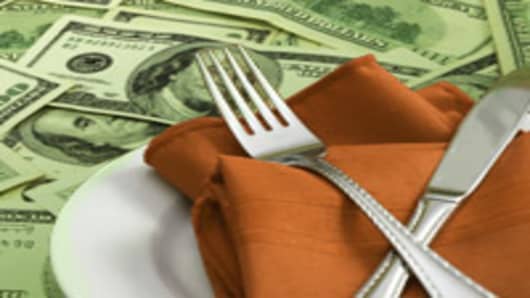Everyone is waiting for inflation.
Corn is up 45 percent the last three months. We haven't seen cotton prices this high since after the Civil War. Soybeans are up. Oil is up. Metals are up. So are coffee and cocoa.
In this era of massive liquidity, everything is up, except for food prices—specifically processed food (made from many of the same commodities and other ingredients whose prices have risen).
According to the USDA, that is going to change. In its most recent CPI report for food, the USDA reported that prices are expected to rise in 2011.
For all food, prices are expected to rise two to three percent, which is double the levels of 2010. Meat prices are expected to rise up to 3.5 percent, and dairy 5.5 percent.
"The forecast for 2011, that remains unchanged, but it's moving to the higher part of that range," said Ephraim Leibtag, who serves as a senior economist for the USDA and out together the report. He added, "The potential to go above that is more likely if current commodity price increases remain where they are or rise even more."
There are some caveats here. First, we are coming off historically low prices, so the jumps in prices need to be viewed on a relative basis.
Second, and perhaps most important, the recent spikes in prices for soft commodities like corn and soybeans are not even priced into retail food prices ... yet.
That means we could see these projections revised upward in the ensuing months.
"Commodities are a big factor whenever we see deviation from the normal rate of food inflation," Leibtag said. "Right now, it indicates cost pressure, and the question is: Will the cost be passed on to the consumer?"
For the most part, competition has inhibited pricing power.
"Even though retail prices have not seen much upward movement, wholesale prices have been climbing much more," the Food Institute's Brian Todd wrote CNBC in an email. "Retailers have been absorbing these increases since late 2009, rather than pass them along to consumers."
But even that seems to be shifting. When wholesale coffee prices rose this year, several big names like JM Smucker, Starbucks and Peet's shifted accordingly.
And now, food giant McDonald's has said it will raise prices.
How can they not?
On a year-over-year basis, meat prices are up more than 6 percent. Eggs are 11 percent more expensive. Even fruits and vegetables, which had seen a deflationary trend, have become more expensive, albeit at a much slower rate than meat and eggs.
If more retailers pass rising costs on to consumers, it could protect profit margins, but in an uneven economy, it carries a risk in terms of potential lost business.
"The last few months, commodity prices like wheat, corn, soybeans, they are starting to have an impact on retail," Leibtag said.
Questions? Comments? Email us at consumernation@cnbc.com


